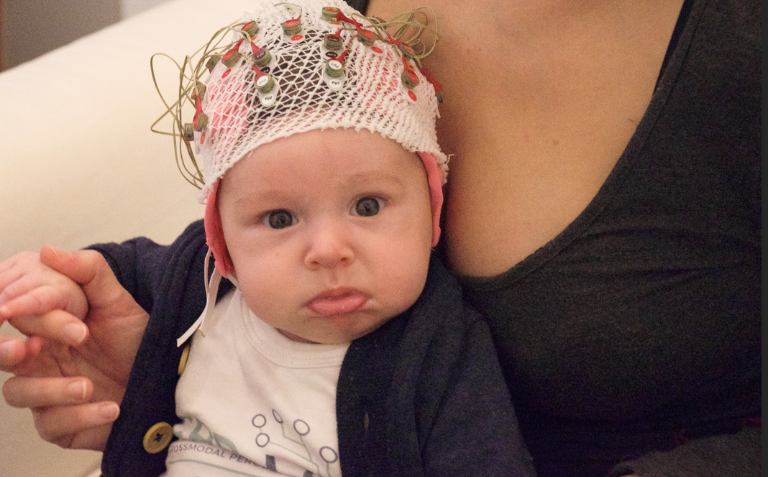
Babies prefer human voices
Share this article
The brains of 4-month-old babies respond preferentially to the human voice over sounds from their environment. This is confirmed by the results of a joint study conducted by a Sense-affiliated researcher from HES-SO Valais-Wallis. These data shed new light on the innate social nature of human beings.
The voice is the most important sound for human beings, providing information on the identity, sex, age and emotional state of the speaker. It is also the basis of our communication through language and other non-linguistic cues.
Adult humans, as well as primates and even dogs, have a specific area of the brain that responds preferentially to voice among all other sounds. This finding suggests an evolutionary origin for this brain region, which seems crucial for social interaction beyond language.
Prof. Olivier Collignon (affiliated researcher at Sense and Visiting Professor at the Haute Ecole de Santé – HES-SO Valais-Wallis) and Roberta Calce (UC Louvain) investigated the existence of such a brain region (which prefers voices to all other sounds) in young children. In other words, they set out to answer the following question: do humans develop a cerebral circuit for vocal selectivity through prolonged experience or, on the contrary, are infants pre-wired to process voices differently?
The child, a social being by nature
Specifically, the research teams sought to determine whether the brains of 4-month-old infants showed a preference for voice over other sounds in the environment. The infants participating in the study listened to a variety of vocal and non-vocal sounds while wearing an electroencephalographic system that recorded their brain activity.
The results, published in the prestigious scientific journal Curent Biology, are unequivocal: four-month-old infants already have a selective brain response to voices. These results shed new light on the development of voice processing, showing a neural selectivity that could promote interest in these crucial sounds from the very start of life, and thus potentially contribute to the child’s social development.
Furthermore, as part of this experiment, the scientists developed a new paradigm called “rapid periodic auditory stimulation”, which enabled them to record a highly robust brain response in young infants in just a few minutes. The team therefore believes that this technique will become an important tool for studying auditory development beyond voice processing.
About The Sense
The Sense Center for Innovation and Research creates and disseminates knowledge about the senses and human behavior for the benefit of society as a whole. The Sense federates applied, fundamental and clinical research with the aim of improving the performance or clinical outcomes of sensory function. This inter-institutional initiative is the result of collaboration between the HES-SO Valais-Wallis, the Centre Hospitalier Universitaire Vaudois (CHUV) and the University of Lausanne (UNIL).
Source: HES-SO Valais Wallis press release